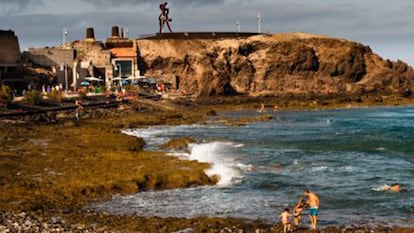After the Canary Islands shark attack, is it safe to go back into the water?
Experienced divers are baffled by the bite a Madrid woman suffered in Gran Canaria


In his more than 150 scuba-diving expeditions off the Canary Islands, Fernando Frias Reis has never encountered a silky shark such as the one that reportedly bit a Madrid tourist in Gran Canaria last week.
“And in the next 1,500 dives I won’t come across one, not unless I go looking for it,” said Frías, who is president of the organization Alliance for Sharks in the Canaries.
Sharks don’t like the taste of human flesh” Fernando Frias Reis, Alliance for Sharks in the Canaries
After he learned what had happened to Cristina Ojeda, the swimmer who was bitten on her arm while she was just 20 meters away from Arinaga beach in Gran Canaria, Frías contacted her.
He believes that the silky shark that bit her may have measured between 1.8 and two meters in length, “even though the body is less than 1.5 meters.” Frías also contacted experts at the University of Miami who confirmed his findings.
“I don’t like to use the word attack because this wasn’t an attack. Sharks attack their prey and not people,” says Frías, who believes that the shark may have mistaken the 38-year-old woman’s arm for a fish and tried to capture it.
“Sharks don’t like the taste of human flesh,” he adds.
Frías explains that silky sharks are “opportunists” that usually go after medium to large sized fishes, especially if they are sick or injured.

Pascual Calabuig, director of the flora and fauna recovery center at Cabildo, Gran Canaria, said it is not normal for sharks to swim close to the coast, and speculated that it may have been attracted by the underwater cages of fish hatcheries in the area.
“The fish hatchery cages are magnets for many types of fish, including stingrays, sharks and birds,” says Ricardo Aguilar, director of research at the organization Oceana en Europa.“It’s a meeting point but what is strange is that a person was attacked.
“Those cages have been there for more than 10 years and this is the first time someone has been bitten,” adds Frías.
All the experts consulted agree that the bite that Ojeda suffered was unusual.
“This is the first time that this has happened, which is an exception to the rule that sharks in the Canaries don’t bite nor do they swim close to the beach,” says Calabuig.
But with a rich biodiversity in the waters surrounding the islands, this doesn’t mean that these type of sharks don’t exist in the area.
This was an exception to the rule that sharks in the Canaries don’t bite nor do they swim close to the beach”
“In the Canaries, we have detected some 86 different species of sharks and sting rays, which are cousins to the sharks. The majority live in the deep waters and don’t measure more than one meter in length,” explains Frías.
He also tends to believe that Ojeda’s unfortunate encounter may have had something to do with the conditions at sea. “There was wind blowing from the south and the ocean’s surge was pulling from the south to the north,” Frías said. “Everything was around the wrong way.”
“If something like this ever happens again in 100 years, they will be able to go back to the record books and say: this has happened once before,” says Calabuig.
English version by Martin Delfín.
Tu suscripción se está usando en otro dispositivo
¿Quieres añadir otro usuario a tu suscripción?
Si continúas leyendo en este dispositivo, no se podrá leer en el otro.
FlechaTu suscripción se está usando en otro dispositivo y solo puedes acceder a EL PAÍS desde un dispositivo a la vez.
Si quieres compartir tu cuenta, cambia tu suscripción a la modalidad Premium, así podrás añadir otro usuario. Cada uno accederá con su propia cuenta de email, lo que os permitirá personalizar vuestra experiencia en EL PAÍS.
¿Tienes una suscripción de empresa? Accede aquí para contratar más cuentas.
En el caso de no saber quién está usando tu cuenta, te recomendamos cambiar tu contraseña aquí.
Si decides continuar compartiendo tu cuenta, este mensaje se mostrará en tu dispositivo y en el de la otra persona que está usando tu cuenta de forma indefinida, afectando a tu experiencia de lectura. Puedes consultar aquí los términos y condiciones de la suscripción digital.








































